历年英语中考考点归纳
河南中考英语考点归纳

河南中考英语考点归纳河南中考英语考点主要涵盖语音、词汇、语法、阅读理解、完形填空、短文填空、书面表达等多个方面。
下面将对其中一些重要的考点进行详细介绍。
一、语音1. 语音辨析在这个考点中,常会涉及到音标、字母的发音、音节的划分、辅音的发音等内容。
学生需要通过听力理解和发音练习,掌握英语语音的基本知识和技巧。
二、词汇1. 同义词与近义词辨析这一考点主要考查学生对于同义词和近义词的辨析能力。
学生需要通过英语词汇的积累和学习,了解不同词语之间的细微区别,并能够在上下文中正确运用。
2. 运用词性变化填空该考点主要考查学生对于词性变化的掌握程度。
学生需要通过语境理解,根据句意选择恰当的词性和词形。
三、语法1. 时态时态是英语语法中的重点内容之一。
学生需要掌握各种时态的构成和用法,能够根据上下文的语境正确运用。
常见的时态有一般现在时、一般过去时、一般将来时、现在进行时等。
2. 语态语态是英语句子中的另一个重要方面。
学生需要了解主动语态和被动语态的构成和转换规则,并在实际运用中掌握正确的用法。
3. 并列与复合句并列与复合句是英语中较为复杂的句型结构。
学生需要通过语法知识和语境理解,正确理解句子之间的关系,并能准确运用并列连词和从属连词。
四、阅读理解1. 短文内容理解这个考点主要考查学生对于短文内容的理解和推理能力。
学生需要通过阅读理解短文,了解文章的主题、情节和人物之间的关系,并能回答相关的问题。
2. 推理判断该考点主要考查学生通过阅读短文推理出正确答案的能力。
学生需要阅读短文,根据事实细节和上下文的线索,进行推断和判断。
五、完形填空1. 段落大意该考点主要考查学生对于整篇文章的理解能力。
学生需要通过理解段落大意,选择合适的单词或短语填入空白处,使得整篇文章通顺、连贯。
六、短文填空1. 词汇运用这个考点主要考查学生对于词汇的掌握程度。
学生需要选择恰当的词汇填入空白处,使得文章意思连贯、通顺。
七、书面表达1. 写作技巧该考点主要考查学生的写作能力。
广州历年英语中考考点归纳
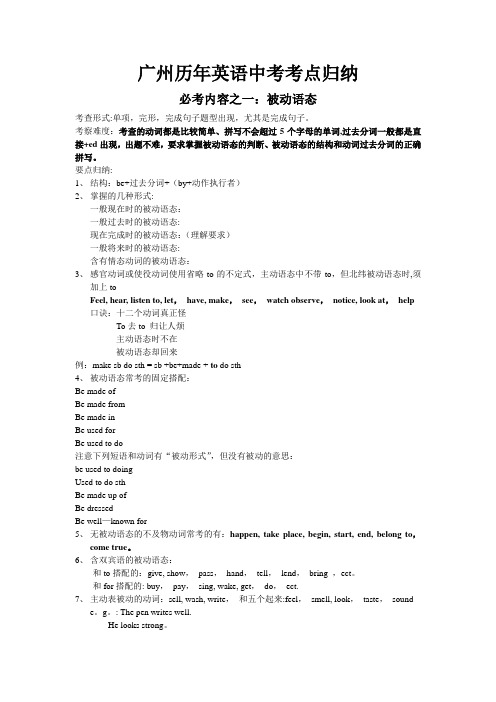
广州历年英语中考考点归纳必考内容之一:被动语态考查形式:单项,完形,完成句子题型出现,尤其是完成句子。
考察难度:考查的动词都是比较简单、拼写不会超过5个字母的单词,过去分词一般都是直接+ed出现,出题不难,要求掌握被动语态的判断、被动语态的结构和动词过去分词的正确拼写。
要点归纳:1、结构:be+过去分词+(by+动作执行者)2、掌握的几种形式:一般现在时的被动语态:一般过去时的被动语态:现在完成时的被动语态:(理解要求)一般将来时的被动语态:含有情态动词的被动语态:3、感官动词或使役动词使用省略to的不定式,主动语态中不带to,但北纬被动语态时,须加上toFeel, hear, listen to, let,have, make,see,watch observe,notice, look at,help 口诀:十二个动词真正怪To去to 归让人烦主动语态时不在被动语态却回来例:make sb do sth = sb +be+made + to do sth4、被动语态常考的固定搭配:Be made ofBe made fromBe made inBe used forBe used to do注意下列短语和动词有“被动形式”,但没有被动的意思:be used to doingUsed to do sthBe made up ofBe dressedBe well—known for5、无被动语态的不及物动词常考的有:happen, take place, begin, start, end, belong to,come true。
6、含双宾语的被动语态:和to搭配的:give, show,pass,hand,tell,lend,bring ,ect。
和for搭配的: buy,pay,sing, wake, get,do,ect.7、主动表被动的动词:sell, wash, write,和五个起来:feel,smell, look,taste,sounde。
初中英语中考考点大汇总
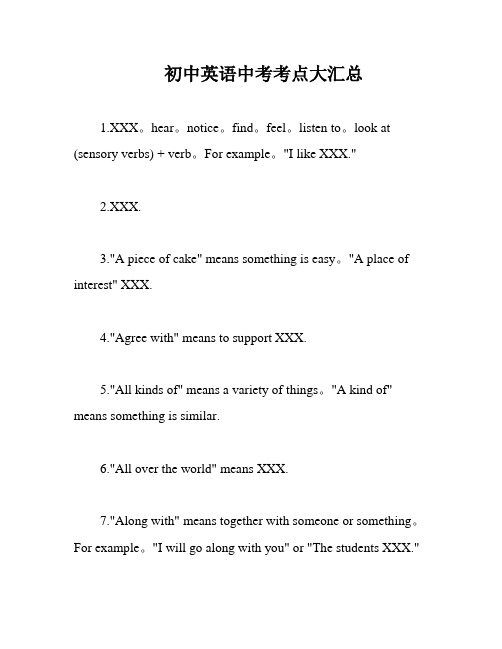
初中英语中考考点大汇总1.XXX。
hear。
notice。
find。
feel。
listen to。
look at (sensory verbs) + verb。
For example。
"I like XXX."2.XXX.3."A piece of cake" means something is easy。
"A place of interest" XXX.4."Agree with" means to support XXX.5."All kinds of" means a variety of things。
"A kind of" means something is similar.6."All over the world" means XXX.7."Along with" means together with someone or something。
For example。
"I will go along with you" or "The students XXX."8."XXX.9."As you can see" means that someone is already aware of something.10."Ask for" means to request something directly。
For example。
"Can I ask you for my book?"11."Ask someone for something" means to request something from XXX.12."Ask someone to do something" means to request that someone do something。
最全中考英语考点汇总
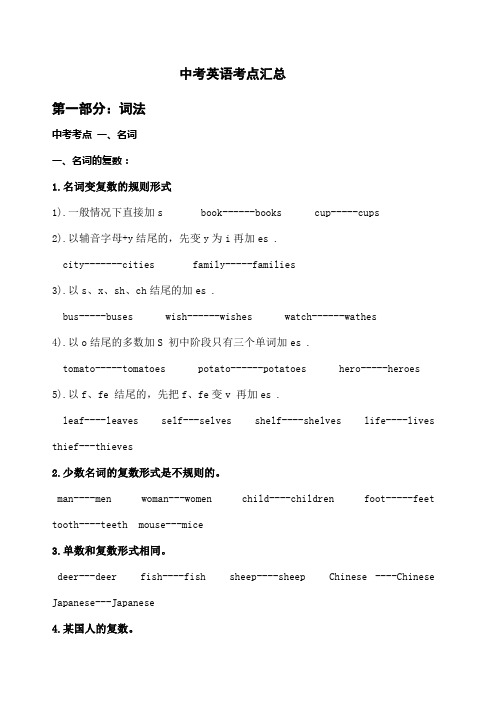
中考英语考点汇总第一部分:词法中考考点一、名词一、名词的复数:1.名词变复数的规则形式1).一般情况下直接加s book------books cup-----cups2).以辅音字母+y结尾的,先变y为i再加es .city-------cities family-----families3).以s、x、sh、ch结尾的加es .bus-----buses wish------wishes watch------wathes4).以o结尾的多数加S 初中阶段只有三个单词加es .tomato-----tomatoes potato------potatoes hero-----heroes 5).以f、fe 结尾的,先把f、fe变v 再加es .leaf----leaves self---selves shelf----shelves life----lives thief---thieves2.少数名词的复数形式是不规则的。
man----men woman---women child----children foot-----feet tooth----teeth mouse---mice3.单数和复数形式相同。
deer---deer fish----fish sheep----sheep Chinese ----Chinese Japanese---Japanese4.某国人的复数。
1). 中、日不变。
Chinese----Chinese Japanese---Japanese2). 英、法变。
Englishman----Englishmen Frenchman----Frenchmen3). 其余s加后面。
American -----Americans German----Germans Australian---Australians二、不可数名词:1.不可数名词:1).不能直接用数字表数量 2).不能直接加a或an 3).没有复数形式4).可用some、any 、lots of、plenty of 、much 修饰 5).可用“量词短语”表示2.不可数名词的数量的表示方法: a / 数字+ 量词 + of + 不可数名词a piece of paper a cup of tea a glass of milk三、名词的所有格:1. ’s 所有格。
初中英语中考知识点总结归纳完整版
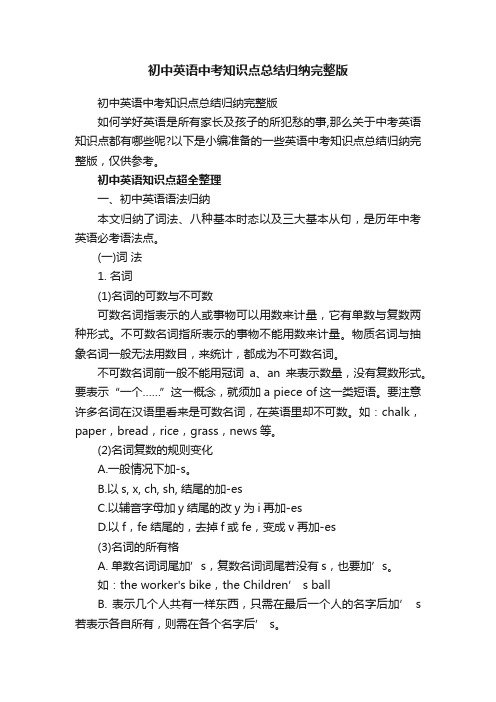
初中英语中考知识点总结归纳完整版初中英语中考知识点总结归纳完整版如何学好英语是所有家长及孩子的所犯愁的事,那么关于中考英语知识点都有哪些呢?以下是小编准备的一些英语中考知识点总结归纳完整版,仅供参考。
初中英语知识点超全整理一、初中英语语法归纳本文归纳了词法、八种基本时态以及三大基本从句,是历年中考英语必考语法点。
(一)词法1. 名词(1)名词的可数与不可数可数名词指表示的人或事物可以用数来计量,它有单数与复数两种形式。
不可数名词指所表示的事物不能用数来计量。
物质名词与抽象名词一般无法用数目,来统计,都成为不可数名词。
不可数名词前一般不能用冠词a、an来表示数量,没有复数形式。
要表示“一个……”这一概念,就须加a piece of这一类短语。
要注意许多名词在汉语里看来是可数名词,在英语里却不可数。
如:chalk,paper,bread,rice,grass,news等。
(2)名词复数的规则变化A.一般情况下加-s。
B.以s, x, ch, sh, 结尾的加-esC.以辅音字母加y结尾的改y为i再加-esD.以f,fe结尾的,去掉f或fe,变成v再加-es(3)名词的所有格A. 单数名词词尾加’s,复数名词词尾若没有s,也要加’s。
如:the worker's bike,the Children’ s ballB. 表示几个人共有一样东西,只需在最后一个人的名字后加’ s 若表示各自所有,则需在各个名字后’ s。
如:This is Lucy and Licy’ s room.These are Kate's and jack’ s rooms.C. 如果是通过在词尾加—s构成的复数形式的名词,只加’。
如:the students’ books,the girls’ blouses(另外:名词+of+名词名词是有生命的,我们就用’s结构来表示所有关系。
如果名词所表示的事物是无生命的,我们就要用名词+of+名词的结构来表示所有关系。
中考英语知识点归纳整理
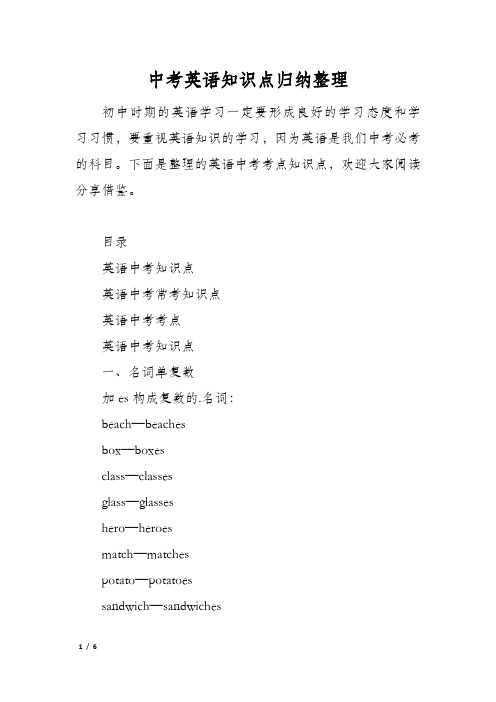
中考英语知识点归纳整理初中时期的英语学习一定要形成良好的学习态度和学习习惯,要重视英语知识的学习,因为英语是我们中考必考的科目。
下面是整理的英语中考考点知识点,欢迎大家阅读分享借鉴。
目录英语中考知识点英语中考常考知识点英语中考考点英语中考知识点一、名词单复数加es构成复数的.名词:beach—beachesbox—boxesclass—classesglass—glasseshero—heroesmatch—matchespotato—potatoessandwich—sandwichestomato—tomatoeswatch—watches将f或fe改为v加es构成复数的名词:knife—knivesleaf—leaveslife—livesshelf—shelveswife—wiveswolf—wolves复数变化不规则的名词:child—childrenChinese—chinesefireman—firemenfish—fish/fishesfoot—feetJapanese—Japaneseman—menmouse—mice policeman—policemen postman—plstmen salesman—salesmensheep—sheeptooth—teethwoman—women返回目录英语中考常考知识点被动语态被动语态由助动词be加及物动词的过去分词构成,助动词be有时态,人称和数的变化。
被动语态的时态是由be的时态决定的,be是什么时态,全句就是什么时态,be动词后面的过去分词不变。
1、各种时态的被动语态结构如下:一般现在时的被动语态:主语+am / is / are (not)+过去分词一般过去时的被动语态:主语+was / were +过去分词现在完成时的被动语态:主语+have / has +been +过去分词一般将来时的被动语态:主语+will +be +过去分词过去将来时的被动语态:主语+would / should + be +过去分词过去进行时的被动语态:主语+was / were + being +过去分词过去完成时的被动语态:主语+had + been +过去分词情态动词的被动语态:情态动词+be+过去分词2、被动语态的用法(1)不知道或没有必要说明动作的执行者是谁,不用by+动作执行者短语。
英语中考高频考点归纳

英语中考高频考点归纳1.冠词a/an/the ①泛指用a或an,特指用the;②在a、e、i、o、u开头的单词前大多数用an;__eleven—year—old boy ③___ (useful,usual, university,unit,European,UFO)..。
___one-year—old boy ____(umbrella, uncle,unusual)____hour ____honest boy ____dishonest boy ④play+球类运动/chess/cards;play +____ +乐器⑤_____ MP5 单个字母前用an的有12个:Mr。
Li has one fox。
李先生有一个狐狸.【例】—Who is ____ girl behind the tree? ——Which one?The one with ____umbrella。
2.感叹句以叹号结尾,先划主语,再划谓语后;有名词用What,没名词用HowWhat +a/an+adj。
+单数名词+主语+谓语。
.!What +adj。
+不可数名词或复数名词+主语+谓语。
.。
!How +adj。
/adv。
+主语+谓语.。
!注:感叹句中常见的不可数名词有news,advice,information,weather,fun【例】___________ friendly the girl is!3.主句用一般将来时/情态动词/祈使句,从句用一般现在时(主将从现的有):if/as soon as/when/unless/until/before+一般现在时【例】—Frank, could we paint the room together tomorrow?—No,if I ____free tomorrow。
A。
be B。
am C. will be D. was 4.名词或代词+定语从句: 先行词是人时可用______/______;先行词是物时可用______/______,有that优先用.作主语不可省略,作宾语可省。
中考英语语法题60个考点

中考英语语法题60个考点以下是中考英语语法题中常考的60 个考点:1.名词:名词的单复数、所有格、可数与不可数名词等。
2.代词:人称代词、物主代词、指示代词、反身代词等。
3.数词:基数词和序数词的用法。
4.冠词:定冠词和不定冠词的用法。
5.形容词和副词:比较级和最高级的构成和用法。
6.介词:常用介词的用法和固定搭配。
7.动词:时态、语态、情态动词、非谓语动词等。
8.句子种类:陈述句、疑问句、祈使句、感叹句等。
9.复合句:宾语从句、状语从句、定语从句等。
10.主谓一致:语法一致、意义一致、就近原则等。
11.倒装句:部分倒装和完全倒装。
12.虚拟语气:条件句中的虚拟语气和名词性从句中的虚拟语气。
13.直接引语和间接引语。
14.被动语态。
15.不定式。
16.动名词。
17.现在分词。
18.过去分词。
19.形容词和副词的比较级和最高级。
20.冠词的用法。
21.介词的用法。
22.数词的用法。
23.代词的用法。
24.连词的用法。
25.感叹句的用法。
26.疑问句的用法。
27.祈使句的用法。
28.时态的用法。
29.语态的用法。
30.非谓语动词的用法。
31.主谓一致的用法。
32.宾语从句的用法。
33.状语从句的用法。
34.定语从句的用法。
35.虚拟语气的用法。
36.直接引语和间接引语的转换。
37.形容词和副词的用法比较。
38.名词的用法。
39.动词的用法。
40.介词短语的用法。
41.固定搭配的用法。
42.同义词和反义词的用法。
43.情景交际用语的用法。
44.阅读理解中的语法知识。
45.写作中的语法知识。
46.听力理解中的语法知识。
47.口语表达中的语法知识。
48.词汇扩展和词汇运用。
49.语法错误的纠正。
50.句子结构的分析。
51.语法规则的记忆和应用。
52.语法学习的方法和技巧。
53.语法练习的方法和技巧。
54.语法考试的应对策略。
55.英语语法的历史和发展。
56.英语语法和其他语言的比较。
57.英语语法在实际生活中的应用。
人教版初中英语中考80个重要考点
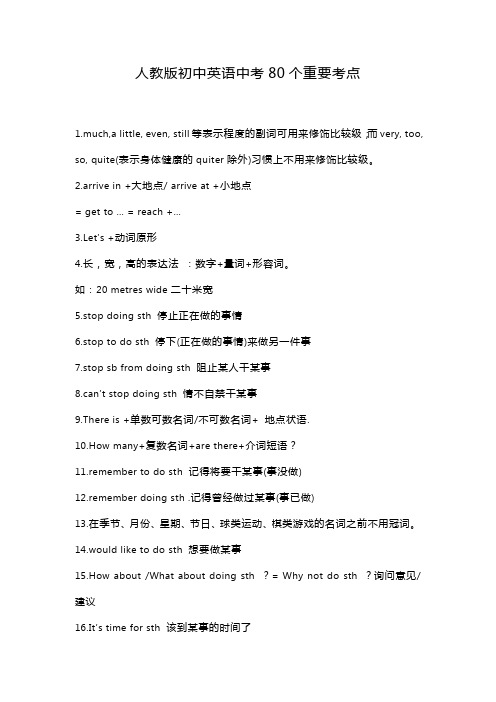
人教版初中英语中考80个重要考点1.much,a little, even, still等表示程度的副词可用来修饰比较级;而very, too, so, quite(表示身体健康的quiter除外)习惯上不用来修饰比较级。
2.arrive in +大地点/ arrive at +小地点= get to … = reach +…3.Let’s +动词原形4.长,宽,高的表达法:数字+量词+形容词。
如:20 metres wide二十米宽5.stop doing sth 停止正在做的事情6.stop to do sth 停下(正在做的事情)来做另一件事7.stop sb from doing sth 阻止某人干某事8.can’t stop doing sth 情不自禁干某事9.There is +单数可数名词/不可数名词+ 地点状语.10.How many+复数名词+are there+介词短语?11.remember to do sth 记得将要干某事(事没做)12.remember doing sth .记得曾经做过某事(事已做)13.在季节、月份、星期、节日、球类运动、棋类游戏的名词之前不用冠词。
14.would like to do sth 想要做某事15.How about /What about doing sth ?= Why not do sth ?询问意见/建议16.It’s time for sth 该到某事的时间了17.It’s time to do sth该到干某事的时间了18.have fun doing sth 很高兴干某事19.make sb do sth 使某人干某事20.can’t afford to do sth 没有足够多钱干某事21.can’t stand doing sth 不能忍受干某事22.mind doing sth 介意干某事23.try to do sth 尽力干某事24.finish doing sth 结束干某事25.decide to do sth 决定干某事26.plan to do sth 计划干某事27.It +takes +sb.+时间+to do sth28.sb. +spend +时间+on sth (in doing sth )29.Can you do sth ?你可以做,,,吗30.be busy doing sth 忙于干某事31.called = named = with the name (of)32.at the age of = when sb was/ were ….33.because of 后面接名词、代词、名词性短语、what从句34.keep doing sth . 表示不间断地持续做某事或一直做某事。
初中英语中考考点大汇总
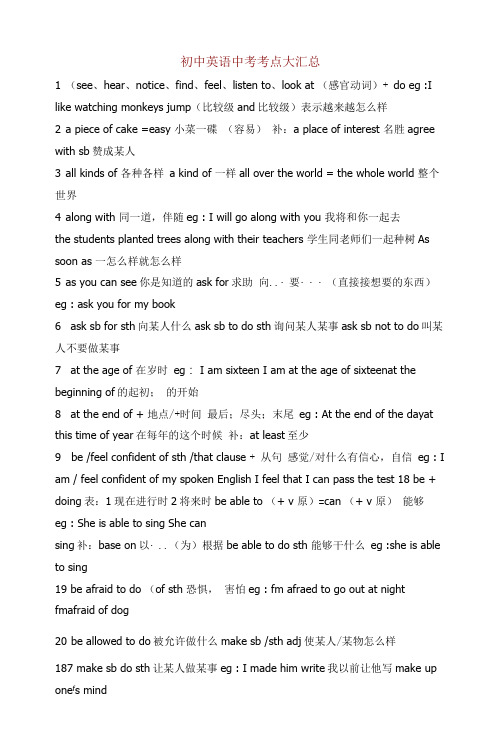
初中英语中考考点大汇总1(see、hear、notice、find、feel、listen to、look at (感官动词)+ do eg :I like watching monkeys jump(比较级and比较级)表示越来越怎么样2a piece of cake =easy 小菜一碟(容易)补:a place of interest 名胜agree with sb赞成某人3all kinds of 各种各样a kind of 一样all over the world = the whole world 整个世界4along with 同一道,伴随eg : I will go along with you 我将和你一起去the students planted trees along with their teachers 学生同老师们一起种树As soon as 一怎么样就怎么样5as you can see你是知道的ask for求助向..・要・・・(直接接想要的东西)eg : ask you for my book6ask sb for sth向某人什么ask sb to do sth询问某人某事ask sb not to do叫某人不要做某事7at the age of 在岁时eg: I am sixteen I am at the age of sixteenat the beginning of的起初;的开始8at the end of + 地点/+时间最后;尽头;末尾eg : At the end of the dayat this time of year在每年的这个时候补:at least至少9be /feel confident of sth /that clause + 从句感觉/对什么有信心,自信eg : I am / feel confident of my spoken English I feel that I can pass the test 18 be + doing表:1现在进行时2将来时be able to (+ v 原)=can (+ v 原)能够eg : She is able to sing She cansing补:base on以・..(为)根据be able to do sth 能够干什么eg :she is able to sing19be afraid to do (of sth 恐惧,害怕eg : fm afraed to go out at night fmafraid of dog20be allowed to do被允许做什么make sb /sth adj使某人/某物怎么样187make sb do sth让某人做某事eg : I made him write我以前让他写make up one f s mind188make...difference to...189mind sb to do mind one's doing 介意做什么most 十名most of + 代190much too + 形容词must be 一定191need +名词need sb do sth需要某人做某事192need to do (实义动词)need do (情态动词)no /neithr of hate to do no /neithr of hate doing193no +名词not anymore = no more 再也不eg: He didn't cry any more He cried nomore他再也不哭not...(形、副)at all eg: He's not tall at all she doesn't junp far at all194not...at all 一点都不not only... but also...不但…而且…not...either 表否定,也不eg : I don't japanse either I don't have sister; either我也没有姐姐195not...until 直到才eg: I didn't sleep until my mother came back The child didn't stop crying until I give her sugar196offer / provide sb with sth 给某人提供offer sb sth ( offer sth to sb 提供什么东西给某人eg : I offer you water (I offer water to you我给你提供水197on one's way to...在谁去那的路上on the one hand 一方面on the other hand 另一方面198on the phone = over the phone 用电话交谈on time 准时in time 及时199one day =some day = someday 一天,有一天one of +可数名词的复数形式200one to another 一个到另一个over and over agin 一遍又一遍的eg : He cleaned the floor over and over agin201part-time job 兼职工作fall-time job 全职工作pay for...付......钱pay the bill 开钱,付钱202please +do pull...up from...把..・从・..拉上来please help yourself203pleased with sbpool into = pore into204practice +doing 练习做某事prefer sth to sth 相对更喜欢eg : I preferphysics to chemisty 在物理和化学中,我更喜欢物理prefer doing to sth更喜欢去做..,不愿意去做.・・eg: He prefers riding a bike todiving他更喜欢骑自行车,不开小车prefer to do sth rather than do sth 宁愿做…也不愿eg: My unde prefers to buy a now car rather than repaiv the used one 我叔叔更喜欢买新的车,也不去修旧车prefer sb not to do sth 更愿意...eg: I prefer her not to come 我不喜欢她不来205pretend to do sth 装着去做什么pretend that 从句eg : The two cheats pretended to be working very hard 这两个骗子装着努力工作He pretended that he did not know the answer 他装着不知道答案rather...than 宁可也不eg : I would rather be a doctor than a teacher 我愿肯当医生,也不当老师He likes dogs rather than cats 他喜欢狗,不喜欢猫225 regard...as 把当作eg: Please give my best regards to your family请带我向你的家人我最好的问候I regard you as my friend我把你当作我的朋友He shows little regard for others 他不爱关心别人226 remid sb about sth提醒某人什么事remid sb to do sth提醒某人做某事eg : he remids me about cooking (he remids me to cook 他提醒我做饭227 remid sb of sth使某人想起什么eg : the pictures remind me of my school days 这照片使我想起了我的学校the words that (which) the teacher talke to remind me of my mother228 return sth to sb还什么东西给某人229 say to oneself 对自己说230 say to sb对某人说231 sb spend somemoney on sth 花了多少钱在某事上232 sb spend sometime with sb 花了多少时间陪谁233 sb spend sometime(in) doing sth 花了多少时间做某事234 sb with sb +is sband sb +are235 see sb do看见某人做过某事see sb doing看见某人正在做某事236 seem to do/be +adj 显得怎么样eg : You seem to be tired You seem to be happy it seem that237 send +sb sth送给某人某物238 send…to…把什么寄到哪里去?239 shock 使震惊eg : Oh , IVs only you ! You give me a shock 啊,是你呀!吓我一跳show sb sth 向某人展示某物 eg : I show her the book.240show sb sth = show sth to sb 拿什么东西给某人看eg: Show me your pen Show your pen to meshow sth to sb 向某人展示某物eg : I show the book to her.241some...others... 一些另一些start...with...从开始begin...with...从开始242stay away from 远离start doing sth/start to dosth 开始做某事eg : We1 re told to stay away from the animals whe visiting the zoo 当我们参观zoo时、我们要远离动物If you want to lose weight you'd better stay auay from the sweet food 徒工你想减肥,你最好远离甜食stop doing停下正在做的事243stop sb from doing sth阻止某人做某事stop sb(from) doing阻止某人做某事244stop to do停下正在做的事去做下一件事such +名这样,这种245suit sb适合某人surprise sb 使某人惊奇to one's surprise 令某人惊奇246take classes 上课take one's temperature 给某人量体温take sb to 把某人带去eg : I take you to the hospital247take walks = take a walk = go for a walk 散步①talk to 对谁说eg : I talk to you ② talk with 和谁说eg : I talk with him③ talk of 谈到eg : we talked of you ④ talk about 谈论关于257 talk with sb和某人说话258 teach sb sth教某人做某事tell sb do sth告诉某人做某事259tell sb sth tell sb that 丛句tell sb not to do sth tell a storytell sb sth告诉某人某事260tell sb to do sth告诉某人做什么tell sb not to do sth告诉某人不要做什么tell...from... thank to 幸亏,由于261thank you for +doing thank sb for sth 因某事而感谢某人the same + 名词(doing)+asthe more... the more...越..,就越..・262the same...(名)...as as...(adj adv)...as 相同the way to do sth=the way of doing sth 做某方面的方法the day before yesterday前天the way to +地方去哪的路e g : Do you know the way to learn EnglishDo you know the way of learning English263the way to…(地点)到哪的路269 too...to...太怎样而不能adj +enough to 足够..・能・・.so...that +丛句太… 所以…(such+名词…that+从句)eg: He is too young to go to school = He is so young that he cant go to school He is old enough to go to school = He is so old that he can go to school270 transalteinto 把什么翻译成什么eg : Trasalte English into Chinese271 travel with sb和某人去旅游272 try one's best to do sth尽某人最大的努力去做某事eg: I w川try my best to learn English well273 try to do sth想干什么,但没成功try doing sth想干什么,已经做过了eg : He tried to climb他想爬上去,但没成功He tried climbing他想爬上去,已经做过了274 try…试衣服have a try试一下275 turn down 开小 <—turn up 开大276 turn off 关上—turn on 打开open 拆开277 upside down 但J着nuless=if not278 visit to...参观某个地方279 wait for sb 等某人280 wait for sb to do sth 等某人做什么wait for sb 等某人wait for sometime 等多少间eg : Would you please wait for me to get ready 等我准备好,好吗?Let's wait for the rain to stop 让我们等雨停吧281 wake sb up把某人叫醒282 want to do sth想做某事283 watch sb do sth观看某人做某事补:wear out把…穿坏284 welcome to +…(地方)欢迎到285 what about +n /doing eg : what about an apple286 what if如果怎么办What if +句子eg : What if it is true ?如果是真的怎么办?What if aliens should come to the earth假如外星人来到地球怎么办?287 what they will do = what to do288 What's the matter ? = WhaVs the trouble ? = Whafs wrong ?有什么困难?289 while +延续性动词290 why don't you do = why not do291 will you please do will you please not do292 with one's best = with the help of sb 在某人的帮助下293 with the help of sb 在某人的帮助下with one f s help294 work at…在某处工作295 work with sb和某人一起工作296 would like sth /to do sth eg : I would like to go to LuZhou297 would you please +do 298 yet :至今,用在否定句中299 you'd better do最好做某事=you'd better not do最好不要做某事300不定式+v(原)301联系动词(taste吃起来/sound听起来/look看起来/semll闻起来)+adj302名词、副词、形容词修饰enongh时,形容词放在之前,名词副词放在之后303太多too much +不可数too many +可数much too相当于very ,修饰形容词304向宾语提问:Whom 305向地点提问:Where 306向方式提问:How307向价格和不可数名词提问:How much 308向可数名词提问:How many309向频率提问:How often 310向时间段提问:How long311向时间提问:what time/when 312向物主代词提问:Whose313向职业提问:what do/does……do 314向主语提问:Who315在将来时中,……以后(用in, 一般时态中,……以后(用after316.It's time for sth.该到做某事的时间了 . It's time to do sth.(Its time for sb. todo sth)该到(某人)做某事的时间了.317.can't wait to do sth.迫不及待地要求做某事.318.ask (tell)sb. (not )to do sth .请(告诉)某人(不)做某事.319.make/let sb. to do sth.让某人做某事.320.hear/see/sb. do sth听见/看见某人做某事.321.had better(not )do sth 最好不做某事.322.Its better to do sth 最好做某事It's best to do sth 最好做某事323.enjoy喜欢做某事finish结束做某事324.keep继续做某事keep on doing sth.继续做某事325.carry on继续做某事go on继续做某事326.feel like喜欢做某事stop to do sth与stop doing sth停下来去做某事(与)停止做某事.327.forget/remember to do 与forget/「emember doing sth,忘t己/,己得去做某事(与)忘记/记得曾经做过事.328.keep(precent,stop)sb. from doing sth 阻止/防止/阻栏栽人做某事prefer....to喜欢・・・,.胜过329.prefer to do sth. rather than do ath,宁愿做某事,而不原做某事.ed to do sth.过去常常做某事.331.What's wong with? .・…出了问题(事)?332.have nothing to do with.・...与...一无关be busy doing sth .在忙于做某事333.tooto.・・・・太・・・・・・以致知于不・・・・・・so ......that.....如此.....以致知于不......334.such.・・・.that如此以致知于不It take sb. some time to do sth ,某人做某事用了一些时间.335.spend .・・・,on sth.(doing sth)花钱/时间做某事.336.pay.….for sth.花费(钱)买某物.337.What /how about……?…,…怎么样(好吗)?338.would like to do sth .想要/愿意做某事..339.I don't think that 我认为不・・・,,Why not do sth.? Why don't you do sth ・为什么不做某事呢340.What do you mean by.…你.…是什么意思?341.What do you think of (How do you like .・・.)你认为・・.,怎么样?342.Mike enjoys collecting stamps . So do L迈克喜欢集邮,我也也喜欢.343.The more, the better,越多越剧好.344.Thanks for doing sth•谢谢你做了某事.345.It is said that..… 据说…356,感官动词see, watch, observe, notice, look at, hear; listen to, smell, taste, feel + do 表示动作的完整性,真实性;+doing表示动作的连续性,进行性,I saw him work in the garden yesterday,昨天我看见他在花园里干活了。
近五年英语中考考点梳理及应试策略

近五年英语中考分析及应试策略一、听力二、单选:1、名词:每年一道,都是考查词义,近五年考查的单词有:14.excuse,offer,promise,decision,15.form, background, shape, introduction, 16.offer, business, question, chance, 17.choice,chance, decision, direction.18.order,decision,promise,agreement2.代词:每年一道,三年复合不定代词(选项都是复合不定代词,考词义),两年答案反身代词(选项物主代词、人称代词、反身代词,翻译考词义),一年不定代词(much,more,little,fewer).3 .冠词:每年一道,1)翻译法:“一个”用a/an,“这个”或“那个”用the. 2)用法:定冠词the:“确定”、“特指”或者“双方都知道的人或物”;不定冠词:“不确定”、“泛指”。
3)还考试了一些特殊用法:the only/the very/the last/the+序数词;a heavy rain; 4)还考了一年零冠词after supper4、介词或介词短语:每年一道14. a conversation _____ a wise person. 15.kill animals ____food or clothing. 16.close the door____you. 17.too young to sit_____the whole concert.18.I stopped_____the night in a village.5.形容词和副词:四年比较级或最高级,三年形容词或副词,具体如下:近两年每年一道比较级或最高级、一道形容词或副词(其中18年考的well意思是“大大地”“很”“相当”表示程度,有点难);16年最高级,15年比较级 never seen a more beautiful sky,14年频率副词always。
中考英语总复习分册知识点考点归纳总结
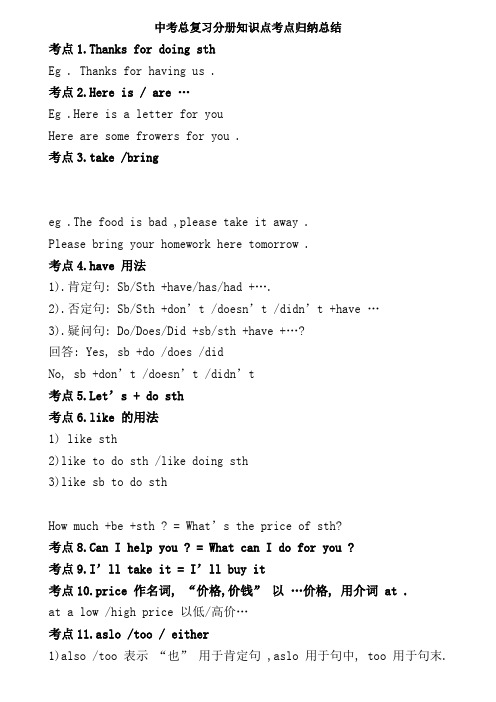
中考总复习分册知识点考点归纳总结考点1.Thanks for doing sthEg . Thanks for having us .考点2.Here is / are …Eg .Here is a letter for youHere are some frowers for you .考点3.take /bringeg .The food is bad ,please take it away .Please bring your homework here tomorrow .考点4.have 用法1).肯定句: Sb/Sth +have/has/had +….2).否定句: Sb/Sth +don’t /doesn’t /didn’t +have …3).疑问句: Do/Does/Did +sb/sth +have +…?回答: Yes, sb +do /does /didNo, sb +don’t /doesn’t /didn’t考点5.Let’s + do sth考点6.like 的用法1) like sth2)like to do sth /like doing sth3)like sb to do sthHow much +be +sth ? = What’s the price of sth?考点8.Can I help you ? = What can I do for you ?考点9.I’ll take it = I’ll buy it考点10.price 作名词, “价格,价钱” 以…价格, 用介词 at .at a low /high price 以低/高价…考点11.aslo /too / either1)also /too 表示“也” 用于肯定句 ,aslo 用于句中, too 用于句末.2)either 用于否定句的句末.考点12.询问sb 的生日是什么时候?When is one’s birthday ? It’s ….考点13.want 用法1)want sth2)want to do sth = would like to do sth = feel like doing sth3)want sb to do sth考点14.and / or /but 区别1)and /or 表示“并列”用法区别and 表示“并列”用于肯定句, 否定句或疑问句用or注:在否定句中并列成分用or 连接,若用and则重复使用前面的否定词.Eg .I don’t like white or black .I have no books and no pens.2).and /butand 表“并列” 而but 表“转折”考点15.think 用法Sb +think +主语+谓语注: 否定前移考点16.play 的用法1)play 及乐器连用,乐器前一定加定冠词the3)play with … 及……玩/玩耍考点17.Can you +动词原形 ? 回答: Yes, I can / No ,I can’t .考点18.句型: May I know / have your name ?考点19.同义句: What’s your favorite subject ?= What subj ect do you like best ?考点20.同义句: take a bus to … = go to …by bus .考点21.询问职业:1)What do /does sb do ?2)What’s one’s job ?3)What + be +sb ?考点22.询问爱好:What +be +one’s +hobby/hobbies ?考点23.help 的用法1) help sb with sth2)help sb do /to do sth3)help do sth4) can’t help doing sth考点24.what time /when1) what time 常用来问钟点2)when 既可以问钟点(这时what time =when ),也可问日期,月份,年份,…..ago. (这时what time ≠when )考点25.How many/How much 的区别1)How many +名词的复数+一般疑问句?2)How much +不可数名词+一般疑问句?3) How much +be + 名词? 询问价格考点26.listen / hear/hear about 的区别1)listen to “听……” 指努力地听…… 强调“听”的过程.2)hear 听到/见 ,强调“听”的结果3)hear about /of 听说, 强调间接地听到考点27.look /wacth /see/read 的区别1)look “看” 指看一看,不管结果如何,强调看的动作,后接宾语时常代at2)watch “看,观看” 特别留意……, 感兴趣地看运动着的东西.3)see “看到/见” 强调看的结果,有意或无意地看到, 无进行时.4)read “看书籍之类”考点28.Excuse me /sorry 的区别1)Excuse me 常用来事前请别人帮忙,或会打扰别人的情况.2)Sorry /I’m sorry “对不起,抱歉”,一般用于事后对所犯错误或不能满足对方的要求等表示歉意.七年级下考点归纳考点e from = be from注: Where do /does sb come from ? =Where be sb from ?What language do /does sb speak ?Sb speak(s) …考点3.dislike = not like = hate考点4. There be 句型归纳There be 句型1). 定义:There be句型表示某处存在某物或某人。
中考英语考点归纳(全)
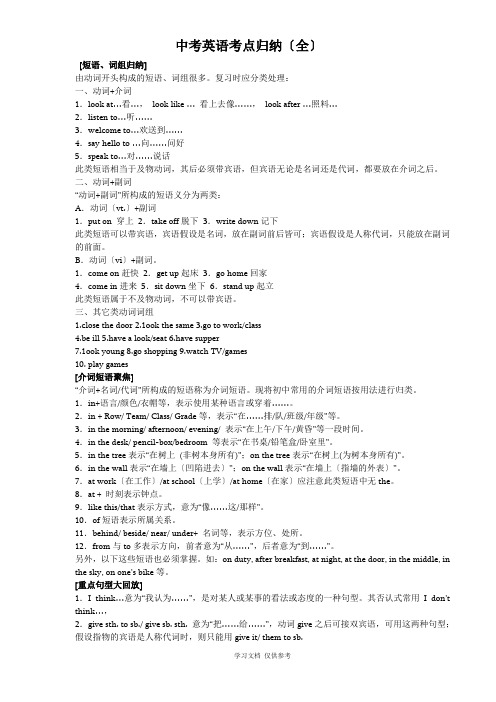
中考英语考点归纳〔全〕[短语、词组归纳]由动词开头构成的短语、词组很多。
复习时应分类处理:一、动词+介词1.look at…看…,look like … 看上去像……,look after …照料…2.listen to…听……3.welcome to…欢送到……4.say hello to …向……问好5.speak to…对……说话此类短语相当于及物动词,其后必须带宾语,但宾语无论是名词还是代词,都要放在介词之后。
二、动词+副词“动词+副词”所构成的短语义分为两类:A.动词〔vt.〕+副词1.put on 穿上2.take off脱下3.write down记下此类短语可以带宾语,宾语假设是名词,放在副词前后皆可;宾语假设是人称代词,只能放在副词的前面。
B.动词〔vi〕+副词。
1.come on赶快2.get up起床3.go home回家4.come in进来5.sit down坐下6.stand up起立此类短语属于不及物动词,不可以带宾语。
三、其它类动词词组1.close the door2.1ook the same3.go to work/class4.be ill5.have a look/seat6.have supper7.1ook young 8.go shopping 9.watch TV/games10. play games[介词短语聚焦]“介词+名词/代词”所构成的短语称为介词短语。
现将初中常用的介词短语按用法进行归类。
1.in+语言/颜色/衣帽等,表示使用某种语言或穿着……。
2.in + Row/ Team/ Class/ Grade等,表示“在……排/队/班级/年级”等。
3.in the morning/ afternoon/ evening/ 表示“在上午/下午/黄昏”等一段时间。
4.in the desk/ pencil-box/bedroom 等表示“在书桌/铅笔盒/卧室里”。
中考英语必考词汇考点集锦
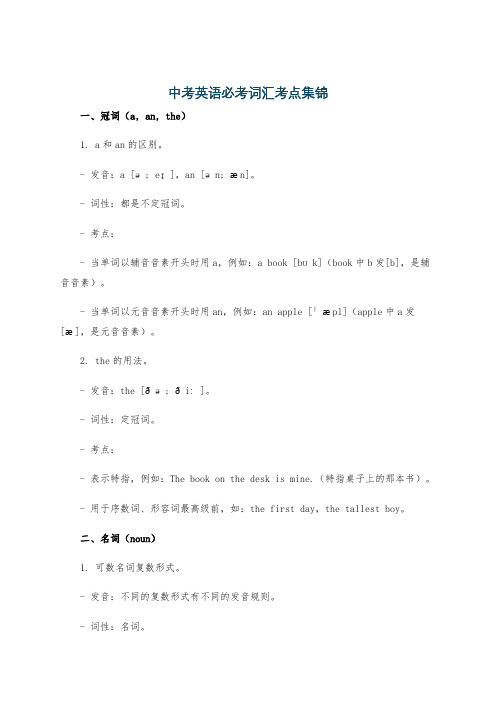
中考英语必考词汇考点集锦一、冠词(a, an, the)1. a和an的区别。
- 发音:a [ə; eɪ],an [ən; æn]。
- 词性:都是不定冠词。
- 考点:- 当单词以辅音音素开头时用a,例如:a book [bʊk](book中b发[b],是辅音音素)。
- 当单词以元音音素开头时用an,例如:an apple [ˈæpl](apple中a发[æ],是元音音素)。
2. the的用法。
- 发音:the [ðə; ðiː]。
- 词性:定冠词。
- 考点:- 表示特指,例如:The book on the desk is mine.(特指桌子上的那本书)。
- 用于序数词、形容词最高级前,如:the first day,the tallest boy。
二、名词(noun)1. 可数名词复数形式。
- 发音:不同的复数形式有不同的发音规则。
- 词性:名词。
- 考点:- 一般情况加 -s,读音:清辅音后读[s],如books [bʊks];浊辅音和元音后读[z],如dogs [dɒgz]。
- 以s, x, ch, sh结尾加 -es,读[ɪz],如boxes [ˈbɒksɪz]。
- 以辅音字母 + y结尾,变y为i加 -es,读[z],如babies [ˈbeɪbɪz]。
- 以f或fe结尾,变f或fe为v加 -es,如leaves [liːvz](leaf的复数)。
2. 不可数名词。
- 发音:根据单词本身而定。
- 词性:名词。
- 考点:- 不可数名词没有复数形式,如water [ˈwɔːtə(r)],不能说waters。
- 表示数量时,用量词,如a glass of water。
三、代词(pronoun)1. 人称代词主格和宾格。
- 发音:- I [aɪ](主格),me [miː](宾格)。
- he [hiː](主格),him [hɪm](宾格)。
- she [ʃiː](主格),her [hɜː(r)](宾格,同时her也是形容词性物主代词)。
中考英语语法考点汇总
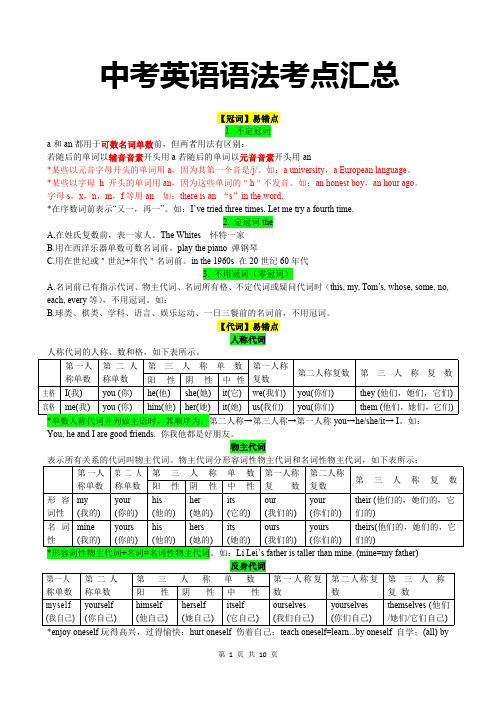
中考英语语法考点汇总【冠词】易错点1.不定冠词a和an都用于可数名词单数前,但两者用法有区别:若随后的单词以辅音音素开头用a若随后的单词以元音音素开头用an*某些以元音字母开头的单词用a,因为其第一个音是/j/。
如:a university,a European language。
*某些以字母h开头的单词用an,因为这些单词的"h"不发音。
如:an honest boy,an hour ago。
字母s,x,n,m,f等用an如:there is an“s”in the word.*在序数词前表示“又一,再一”。
如:I’ve tried three times.Let me try a fourth time.2.定冠词theA.在姓氏复数前,表一家人。
The Whites怀特一家B.用在西洋乐器单数可数名词前。
play the piano弹钢琴C.用在世纪或"世纪+年代"名词前。
in the1960s在20世纪60年代3.不用冠词(零冠词)A.名词前已有指示代词、物主代词、名词所有格、不定代词或疑问代词时(this,my,Tom’s,whose,some,no, each,every等),不用冠词。
如:B.球类、棋类、学科、语言、娱乐运动、一日三餐前的名词前,不用冠词。
【代词】易错点人称代词人称代词的人称、数和格,如下表所示。
You,he and I are good friends.你我他都是好朋友。
物主代词表示所有关系的代词叫物主代词。
物主代词分形容词性物主代词和名词性物主代词,如下表所示:*enjoy oneself玩得高兴,过得愉快;hurt oneself伤着自己;teach oneself=learn...by oneself自学;(all)byoneself(完全)独立地;help oneself to请自便,随便吃……;look after oneself=take care of oneself自理,照顾自己;leave one by oneself把……单独留下;lose oneself in陶醉于,沉浸于;dress oneself穿衣;make oneself at home不拘束,随便;wash oneself洗澡。
中考英语考点(超详细),中考复习必备!.doc

中考英语考点(超详细),中考复习必备!中考英语全部考点-详细归纳专题一名词考点一:可数名词1.可数名词变化规则(1)一般情况在词尾加s。
例如:cakes cars bananas(2)以s/x/ch/sh结尾的名词加es。
例如:classes boxes matches dishs(3)以“辅音字母加y”结尾的名词,变y为i再加es。
例如:flies cities。
(4)以o结尾的词,有生命加es,无生命加s。
例如:heroes tomatoes potatoes。
(5)以f或fe结尾的名词,变f或fe为v,再加es。
例如:knives wives wolves。
(6)特殊名词变复数①常见的不规则名词变复数:foot feet 脚;man men男人;goose geese 鹅;woman women女人;tooth teeth牙;child children孩子;mouse mice 老鼠ox oxen公牛②还有一些单复数形式相同的单词deer 鹿sheep 羊fish 鱼(7)常见的表示不同国家人的单词的单复数名称总称(谓语用复数)一个人两个人原型中国人the Chinesea Chinesetwo ChineseChina澳洲人the Australiansan Australiantwo Australian Australian法国人the Frencha Frenchmantwo Frenchmen France日本人the Japanesea Japanesetwo JapaneseJapan美国人the Americansa Americantwo AmericansAmerica德国人the Germansa Germantwo GermansGermany英国人the Englishan Englishmantwo EnglishmenEngland中日不变英法变(变a为e),其余后面加s考点二:不可数名词1.不可数名词是不能用数量计算的词,不能与不定冠词“a”“an”或基数词连用,没有复数形式。
中考英语语法考点梳理真题必刷非谓语动词
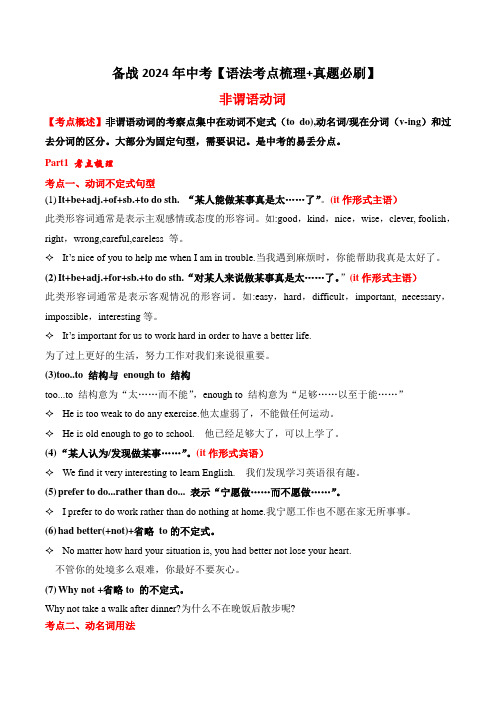
备战2024年中考【语法考点梳理+真题必刷】非谓语动词【考点概述】非谓语动词的考察点集中在动词不定式(to do),动名词/现在分词(v-ing)和过去分词的区分。
大部分为固定句型,需要识记。
是中考的易丢分点。
Part1 考点梳理考点一、动词不定式句型(1)It+be+adj.+of+sb.+to do sth.“某人能做某事真是太……了”。
(it作形式主语)此类形容词通常是表示主观感情或态度的形容词。
如:good,kind,nice,wise,clever, foolish,right,wrong,careful,careless 等。
✧It’s nice of you to help me when I am in trouble.当我遇到麻烦时,你能帮助我真是太好了。
(2)It+be+adj.+for+sb.+to do sth.“对某人来说做某事真是太……了。
”(it作形式主语)此类形容词通常是表示客观情况的形容词。
如:easy,hard,difficult,important, necessary,impossible,interesting等。
✧It’s important for us to work hard in order to have a better life.为了过上更好的生活,努力工作对我们来说很重要。
(3)too..to 结构与enough to 结构too...to 结构意为“太……而不能”,enough to 结构意为“足够……以至于能……”✧He is too weak to do any exercise.他太虚弱了,不能做任何运动。
✧He is old enough to go to school.他已经足够大了,可以上学了。
(4)“某人认为/发现做某事……”。
(it作形式宾语)✧We find it very interesting to learn English.我们发现学习英语很有趣。
中考英语动词考点归纳整理(共四大类)

中考英语动词考点一、考试中常出现的动词短语1.a bottle/glass/cup… of 一瓶/玻璃杯/茶杯......2.a few一些3.a kind of一种;一类4.a little一点;少量5.a lot of…= (lots of…)许多的......6.a moment later片刻之后7.a number of若干的;许多的8.a pair of一双;一副9.a piece of一块(张;片;只)10.all day(long)整天;一天到晚11.all kinds of各种各样的......12.all one’s life一生;终生13.all over到处;结束14.all over the world全世界15.all right行了;好吧;(病)好了16.all the same仍然17.all the time①一直;始终②老是(美国英语)18.arrive at/in到达某地19.as…as… 和......一样......20.as…as one can(=as…as possible)尽量......21.as soon as 一......就......22.at breakfast早餐时23.at first起先;开始的时候24.at home在家25.at last最后;终于26.at night在夜里27.at noon在正午28.at once立刻;马上29.at school在学校上课30.at the back of在……的后面31.at the head of在……的前面32.at the moment此刻33.at the same time同时34.at this time of (the)year在(一年中)这个时节里35.at times时常;有时36.at work在工作37.be able to do sth.(= can+V.) 能够38.be angry with sb.生某人的气be angry at/about sth.生某事的气39.be born出生40.be different from…和……不同41.be full of充满着……42.be good at善于be bad at 拙于43.be good for对……有益的be bad for对……有害的44.be in hospital生病住院be in the hospital在医院45.be late for迟到46.be like像......47.be made of (be made from)……制的;用…….制成的48.be/get ready准备好49.be sure肯定;确定50.break down①(机械)损坏②拆散(某物)51.by+交通工具搭乘某交通工具52.by the way顺便一提53.by then到那时54.catch (a) cold; have acold感冒55.change one’s mind改变想法(注意)e back回来e down下来e from①出生于②来自于e in进入;进来come out出来e over1过来;顺便来访e around(走)过来(绕行而来)62.day after day日复一日地;天天63.do +V.ing做某事64.do sport做运动;参加(体育)运动65.does well①做得很好②成功③成绩很好66.each other互相67.eat up吃完68.eith er…or…要么……要么......69.enjoy oneself过得愉快70.fall behind落后;跟不上71.fall off①跌落;掉下②(质或量)下降72.far away遥远73.feel like doing sth. 想要做某事74.feel tired感到疲劳75.find out查明;发现;了解76.from now on从今以后;今后77.from… to… 从……到……78.get back①返回②取回79.get down①下来;落下②记下来80.get dressed穿衣服;打扮81.get home到家82.get into①进入②搭乘(出租车)③陷入(坏的情况)83.get off ①下车②起飞84.get on①上车②生活85.get on (with…) = getalong (with…)①生活②与(某人)相处③(活动)有进展86.get out of①从......出来②从出租车(轿车)下来87.get ready to do sth.准备做某事88.get up①起床②起立89.get warm (long)变暖和(长)90.give...a call给……打电话91.give back归还;送回92.go back回去93.go for a walk散步94.go home回家95.go on继续96.go shopping去购物97.go to bed睡觉(并未入睡)98.go to school上学99.go to sleep入睡;睡着100.go to the cinema去看电影101.grow up成年;长大成人102.half an hour半小时103.have a drink of喝一点……104.have a good time玩得很高兴;过得愉快105.have a look (at)看一看106.have a match比赛have a test测验107.have a meeting开会108.have a rest休息109.have a swim游泳110.have a talk谈话111.have a walk散步112.have a wash洗(手,脸等)113.have breakfast吃早饭114.have lessons/classes上课115.have lunch吃午饭116.have sport进行体育活动117.have supper吃晚饭118.have to不得不;必须119.hear from + sb.收到某人的来信120.hear of听说121.help sb.with sth在某事上帮某人help sb.(to) do sth.帮助某人做某事122.hold a meeting(= have a meeting)举行会议123.hold on①等一等(别挂电话) ②坚持;继续124.hour after hour一小时又一小时地;持续地125.how long①(时间)多长;多长②(长度)多长126.how many/much2多少/多少(钱)127.how often多久一次128.how old几岁;多大(年纪)129.hundreds of数百130.hurry off匆匆离去;赶快去131.hurry up赶快132.in a minute一会儿;立刻133.in bed 躺在床上134.in English用英语(说)135.in front在前方(面)136.in front of 在......前面137.in time正好;及时138.in the middle of 在……中间139.jump into跳进……140.just a moment等一会儿141.just then正在那时142.keep busy(一直)忙碌st year去年ter on过后;以后ugh at嘲笑146.listen to 听……(讲话)147.look after照料;照顾148.look at(注视着)看;观看149.look for寻找150.look into 往……里看;调查151.look like看起来像152.look over(医生)检查153.look the same看起来一样154.lots of=a lot of许多;很多;大量155.make friends with与……交朋友156.make sure确保;证实157.middle school中学158.move away搬开;搬走159.move to搬到160.neither… nor…既不……也不161.never mind不要紧;没关系162.next time下次163.no longer=not…any longer不再164.not … at all一点也不;根本不(用来加强not的语气)165.not at all不用谢;别客气166.not so … as不像;不如167.on foot走路;步行168.on show展览;被陈列着169.on the earth在地球上170.on the (one’s) way在途中;在路上171.on time按时;准时172.out of在……之外;从……里头173.over there在那边;在对面174.Party member共产党员175.pass on传递176.pay for付钱;支付;付出代价177.play with玩耍178.post office邮局179.pull out of拉出,取出180.pull …up from把……从……拉上来181.put on穿;戴上;上演182.right away立刻;马上183.right now现在;刚刚184.send away撵走;开除;解雇185.send up发射186.sit down坐下187.so …that如此……以至于188.speak to sb.和某人说话189.spend some time on在……花时间190.stop sb.from doing sth.阻止某人做某事191.take a rest休息192.take a walk散步193.take away拿走194.take down取下195.take exercise锻炼(身体)196.take off脱掉衣物197.take one’s time①不急;慢慢干②用去(某人)3时间198.take part in参加199.take/have some medicine服药200.take the train/a boat/a bus…坐火车/船/公共汽车……201.talk about谈论202.talk to与……谈话203.teach oneself自学204.tell (sb.) about 告诉(某人)……205.the other(s)另一个(其他的)206.think about考虑207.too …to太……不能……208.try on试穿;试试看209.turn green变绿210.turn off关掉(自来水,电灯,收音机等)211.turn on开;旋开(电灯,无线电等)212.up and down上上下下;来回地213.very much很;非常214.wait for等候;等待215.wear out穿坏;穿旧;用尽216.with one’s help在(某人)帮助下217.work on①从事……工作②继续工作③研究218.worry about担心二、某些动词后接不定式和动名词的区别1.forget doing sth.忘记做过某事forget to do sth.忘记要做某事(未做)I forget to bring my homework.我忘记带作业了。
- 1、下载文档前请自行甄别文档内容的完整性,平台不提供额外的编辑、内容补充、找答案等附加服务。
- 2、"仅部分预览"的文档,不可在线预览部分如存在完整性等问题,可反馈申请退款(可完整预览的文档不适用该条件!)。
- 3、如文档侵犯您的权益,请联系客服反馈,我们会尽快为您处理(人工客服工作时间:9:00-18:30)。
历年英语中考考点归纳必考内容之一:被动语态考查形式:单项,完形,完成句子题型出现,尤其是完成句子。
考察难度:考查的动词都是比较简单、拼写不会超过5个字母的单词,过去分词一般都是直接+ed出现,出题不难,要求掌握被动语态的判断、被动语态的结构和动词过去分词的正确拼写。
要点归纳:1、结构:be+过去分词+(by+动作执行者)2、掌握的几种形式:一般现在时的被动语态:一般过去时的被动语态:现在完成时的被动语态:(理解要求)一般将来时的被动语态:含有情态动词的被动语态:3、感官动词或使役动词使用省略to的不定式,主动语态中不带to,但北纬被动语态时,须加上toFeel, hear, listen to, let, have, make, see, watch observe, notice, look at, help口诀:十二个动词真正怪To去to 归让人烦主动语态时不在被动语态却回来例:make sb do sth = sb +be+made + to do sth4、被动语态常考的固定搭配:Be made ofBe made fromBe made inBe used forBe used to do注意下列短语和动词有“被动形式”,但没有被动的意思:be used to doingUsed to do sthBe made up ofBe dressedBe well-known for5、无被动语态的不及物动词常考的有:happen, take place, begin, start, end, belong to,come true.6、含双宾语的被动语态:和to搭配的:give, show, pass, hand, tell, lend, bring ,ect.和for搭配的:buy, pay, sing, wake, get, do, ect.7、主动表被动的动词:sell, wash, write, 和五个起来:feel, smell, look, taste, sounde.g.: The pen writes well.He looks strong.8、用法引导:A.强调动作的承受者B.不知动作的执行者C.没有必要指出动作的执行人D. 下列句子要注意It is said that….It is known that….It is believed that….必考内容之二:宾语从句考查形式:单项、完成句子考察难度:考察全面,考查必须掌握引导词、时态和语序这三个要素。
要点归纳:1、陈述语序2、时态:主句为一般现在时,______________________________时态:主句为一般过去时,______________________________3、that, whether, if, what, who, which, whose, when, where ect.4、宾语从句的简化:但主句的主语和从句的主语为同一人时,从句可以简化为疑问词+不定式。
必考内容之三:状语从句考查形式:单项、完形、,完成句子,重点考查条件状语从句、目的壮语从句、时间状语从句、原因状语从句、结果状语从句,时间状语从句往往结合过去进行时考查,主长从短:I was sleeping when you came in. 主短从长:When he was watching TV, I ran in. 完形填空出现一般都是选择正确的引导词。
考查难度:考察较多的是引导词方面的,对于时态方面的考查较少。
考生复习时除了要掌握状语从句各个连词的意义,同时也需要掌握“主将从现”“主祈从现”“主情从现”的时态要求。
要点归纳1、时间状语从句:when & while 的运用_________________________________________________________注:while有“然而”的意思,表转折2、as soon as___________________________________________________3、not…until…._________________________________________________4、if & unless___________________________________________________5、so…that…___________________________________________________6、so that_________________________________________________________7、because______________________________________________________考查内容之四:定语从句考查形式:单选、完型考察难度:主要考查引导词的选择——关系代词that, which, who以及关系副词where, when。
要点归纳:1、that:人或物,人+物2、which:物3、who:人4、when & where:地点、时间记忆诀窍:从句完整则用when/where,不完整则用which、that,选项同时which & that,则一定不选which/that必考内容之五:感叹句考查形式:单词、完成句子考查难度:考查较简单,基本属于送分题。
考生须掌握how和what引导的感叹句的基本句型,并且熟悉一些常用形容词和副词的拼写。
要点归纳:1、what + a / an +adj. +单数名词(+ 主语+ 谓语)!2、What +adj. +复数名词(+主语+ 谓语)!3、What+adj. +不可数名词(+主语+谓语)!常考的几个不可数名词:food,news,weather,fun,music,work,information,advice,suggestion。
注意:what引导的感叹句,主语+谓语可以省略。
4、How + adj. +a / an + 单数名词(+主语+谓语)!5、How+adj./adv.+主语+谓语!6、How + 句子!必考内容之六:反意疑问句考查形式:单项选择考查难度:较简单,考生只需掌握该语法点的原则,一般都能做对。
要点归纳:1、原则:(1)前肯后否,前否后肯(2)前名后代(3)时态一致常考的否定词:never,few,little,hardly,no,seldom,nobody,nothing,none2、常考句型:含有have、has、had时若出现在完成时态中,则用________________提问否则,找助动词do/dose/did 帮忙They had to leave early to catch the train, _____ ______?He has few friends in the new school, _______ ________?Had better 用hadWe’d better stay at home todays, __________?There be …? ________ there?Let’s…, _______? Let us…, ______?祈使句,___________?3、反义疑问句的回答:根据实际答题。
4、注:有前后缀例外He is unhappy, isn’t he?They dislike me, don’t they?5、I think/believe +that 从句,反义疑问句应反从不反主:I think Tom has left, hasn’t he?I don’t believe you are right, are you?常考内容之七:动词考查形式:时态、情态动词、动词短语、分词做形容词、非谓语动词考查难度“动词是词法的核心,考查范围较大,难度较大一、时态要点归纳考点一:主将从现(在状语从句已经提到)考点二:现在完成时4大用法:结果,延续,经历,移位时间标志:for + 时间段、since+ 时间点/一般过去时的句子、already、yet、every、never、“How long…?”、含有“time”表示次数的句子中要点归纳:区分:have been to + 地点__________________________have gone to + 地点_________________________have been in + 地点+ for + 时间段__________________________瞬间动词与延续性动词间的转换:die – be dead buy—have borrow—keep leave/go—be away(from)make friends—be friends begin/start—be onarrive/get to/reach/come—be in/be at/stayjoin (the Party)—be a (Party) member /be in (the Party)核心句型:It is + 时间+since+一般过去时的句子考点三:过去进行时(在时间状语从句中考查)考点四:一般现在时(客观真理)、一般过去时(在宾语从句中考查)二、情态动词归纳情态动词有:must, have to, had better, can, could, be able to, may, might, need, will, would, shall, should + 动词原形考点一:must can 表示推测的运用考点二:mustn’t的运用,意思是_______________________________________________考点三:情态动词一般疑问句的回答Must ……? Yes, S + must. No, S +needn’tNeed…….? Yes, S + may No, S + musn’t三、非谓语动词归纳:和介词一样非常灵活,在句法中,不作谓语,所有句子成分都可充当。
只考查动词不定式、动名词作宾语To + do ( 否定式———not + to + do)1、只能接to +do的动词有:decide, agree, hope, want, refuse, plan, need, wish +to do2、有些动词加to do 做宾语补足语,常见的有:Ask, tell, want, teach + sb. +to do +sth.3、加to + do 的重点句型有:(1)It takes sb. Some time/money to do sth. 做某事花费某人多少时间、金钱(2)It is + adj. + for/of sb. to do sth. 做某事怎样(3)Would you like to….?4、后接省略to的动词不定式的动词有一感(feel)二听(hear, listen to)三让(have, make, let)五看(watch, ,see, look at, notice, observe),半个帮助(help可以带to,也可以省略)改为被动语态时,to要还原例如:This little boy is made to clean his bedroom every week.5、省略to的情况有(1)情态动词后(2)Why not/why don’t you(3)Would rather…than…Doing (否定式———not doing)1、加doing作非谓语动词常考的有:enjoy,mind,suggest,miss,admit,deny,imagine,practice+doing sth.2、加doing的情况有:(1)介词后+doing 例如:give up doing sth., be interested in doing sth.等(2)Feel lilke + doing (喜欢做某事)/prefer doing sth. to doing sth.(更喜欢…..)(3)To作介词时的几个常用短语:look forward to/be used to/pay attention to + doing3、既可加to do 也可加doing,并意思相近的动词有:begin, start, like, love, hate4、既可加to do 也可加doing,但意思不同的动词有:Forget to do 忘记去做某事(事情还没有做)Forget doing 忘记做过某事(事情已经做了,但是忘了)Remember to do 记得去做某事(事情还没有做)Remember doing 记得做过某事(事情已经做了)Regret to do (对将要做的事)遗憾Regret doing (对已经做过的事)遗憾Stop to do 停下来去做某事(去另外一件事情)Stop doing 停止做某事(停止正在做的事情)归纳记忆:stop…from + doing = prevent… from doingTry to do 尽力做某事(区分:manage to do 设法做某事)Try doing 尝试去做某事Keep/go on to do 继续去做某事(停止原来做的事情而继续另一件事情)Keep/go on doing 继续做同一件事情Mean to do = plan to do 打算/计划去做某事Mean doing 意味着做某事重点区分下列搭配:See / watch sb. do sth. 看到、看着某人做某事(已做了)See / watch sb. doing sth. 看到、看着某人正在做某事(在做)Hear / notice sb. do sth. 听到/注意到某人做某事(已做了)Hear / notice sb. doing sth. 听到/注意到某人正在做某事(在做)关注:have sth. done/ get sth. done need doing / want doing四、动词短语近年广州中考高频动词短语归纳动词和动词短语在广州市中考里面主要是考察词义辨析,是历年中考的必考内容。
